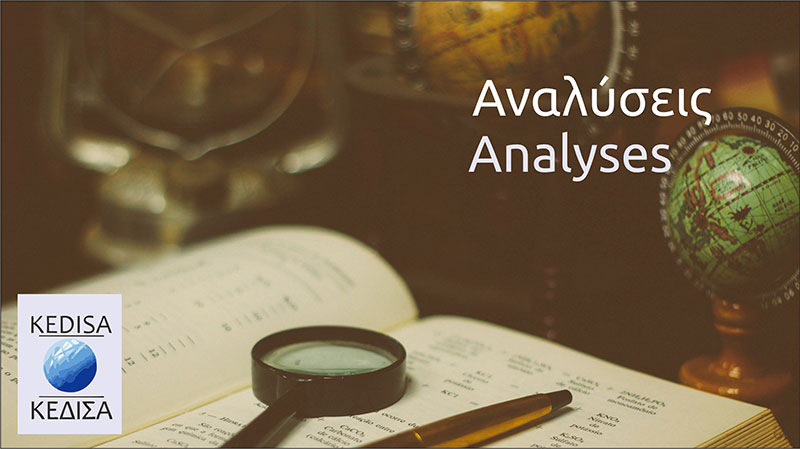By Georgios Koukakis, Analyst KEDISA
It has been almost two months since the Russian Federation invaded Ukraine, claiming to assist the Donetsk People’s Republics (DPR) and Lugansk People’s Republic (LPR). At this point we should recall that on February 21, 2022, just two days before the invasion, the Russian President held a meeting of the Security Council of the Russian Federation, whose members had advocated for the recognition of the independence of the DPR and LPR.[1]
During the meeting, President Putin had stated that although Russia desires a peaceful settlement of the dispute, considers Ukraine‘s accession to NATO as a threat to Russia. A few hours later, after some telephone communications between the Russian President and his French and German counterparts,[2] there was an announcement about the signing of a Presidential Decree recognizing the independence of the DPR and LPR, along with the signing of a “Treaty of Friendship, Cooperation and Mutual Assistance” with its leaders.[3]
Therefore, in the context of the above treaty, the Russian Federation invaded Ukraine to assist these two allied entities. As the international community watches closely over the development of military operations in Ukraine and the efforts to find a solution through diplomacy, a huge “WHY?” is generated in most people’s minds. Could the Russian course of action have been foreseen? Is there a plan behind all this or is the Russian President just acting impulsively? What will be his next move?
The answer to the previous question is positive and it is “well hidden” inside the Security Council. Most modern states have established an executive body called the National Security Council, whose purpose is to formulate a Strategy and to advise its Head of State, depending on the current regime. This body in the case of Russia was established in 1992 and is called the Security Council of the Russian Federation (Sovet Bezopasnosti or SB)[4]. Its influence on the country’s Foreign Policy is so great that some have stated that: «If there is any body in Russian politics that represents an ‘inner circle’ or could be seen as – in functional terms at least – the equivalent of the Soviet Politburo, then the Security Council of the Russian Federation is that body»[5]
Within the framework of its above-mentioned responsibilities, the Council draws up the National Security Strategy. This institutional document of a strategic nature describes the general framework within all state actors must act in the long run. More specifically, it describes the current situation and how it is expected to evolve, defines national interests, sets priorities, and finally provides general guidelines on the desired course of action of state services. Then, considering what is defined in it, each service prepares its own sub-strategy specifying the above elements.
The current National Security Strategy of the Russian Federation was adopted in 2021.[6] It states that there is currently a period of instability and tension, during which third countries intervene in Russia’s internal affairs. Also, although there is an increasing threat of military violence and sanctions, Russia has shown that it can cope effectively in this environment. It also refers to an attempt to erode Russia’s ideology and traditional principles, which imposes their protection.
Russia’s national interests set out in the 2021 National Security Strategy include individual and collective values such as the well-being of citizens, state sovereignty and territorial integrity, and the priorities outlined are the protection of the Russian people and the development of human resources, the country’s defense, state and public security, information security, economic security, scientific and technological development, environmental security and the rational use of natural resources, the protection of traditional Russian intellectual and moral values, culture and historical memory, strategic stability and mutually beneficial international cooperation.
Although this was interpreted by some as an introversion move by Russia,[7] unfortunately this was not verified. This is because the same Strategy -a few lines below at Part IV- states that one of the military threats to Russia’s national security is NATO, which has planned the development of missile systems in Europe and Asia. In fact, one of the ways to deal with this threat -as mentioned- is to maintain an adequate level of nuclear deterrence along with the protection of both Russia’s national interests and its citizens outside Russia’s homeland.
As far as the Russian economy is concerned, it determines that it will contribute to the above direction through the appropriate preparation to meet the needs of the state and the needs of the population in time of war. It also refers to the protection of citizens from politically biased decisions of foreign and international (transnational) courts, while in the field of information, it points out that public and state security will be ensured through the suppression of information and other activities. At this point it is worth noting that this is the first time that a special text concerning Information Security appears in this strategic document.
The specific paragraphs of the Strategy state, inter alia, that the Russian Federation is receiving more and more cyber-attacks from foreign countries, with the goal of intervening in its internal affairs, while at the same time conducting intelligence operations by foreign state special services, which distort historical facts. To cope with this “information war” being conducted against the Russian Federation, it must intensify its efforts to use its own means. The thing is that: «Russia perceives the information space in very geopolitical terms, with their domestic information space representing a continuation of territorial state borders, which they view as constantly being violated by foreign intrusions»[8]
Regarding economic security, it declaires that one of the ways in which the effectiveness of the state macroeconomic policy will be improved is by developing a risk-oriented strategic planning system, taking into account possible external and internal challenges and threats. In the field of culture, the Strategy states that traditional Russian values are being attacked by the United States and its allies, and that Western habits threaten the loss of Russian cultural sovereignty, therefore, it determines measures to suppress the publication of media products that contain words and expressions that do not comply with the rules of the modern Russian literary. Finally, one of its foreign policy goals is to strengthen relations with the citizens of Belarus and Ukraine.
Although it is very easy to interpret events after having occurred, we can only conclude that almost every action of the Russian President was part of the National Security Strategy, indicating its future cations.[9] The well-known anti-American and anti-Western stance expressed in the text,[10] although not surprising, should concern us due to the frequent reports and overt descriptions of the US and NATO characterized as major threats. Through the brief examination of the Russian National Security Strategy we just concluded, we only realize that the events we are experiencing today are nothing more than the results of its implementation.
The Russian Federation wanted to protect Russian citizens outside its homeland and to strengthen its relations with the Ukrainians. Because of the West’s actions -according to the Russian way of thinking – that blocked these efforts, Russia invaded Ukraine to protect the rights of its citizens. It had already prepared -as we examined- its economy for the possibility of war, while being a permanent member of the UN Security Council agave Russia the ability to pose veto -as I had predicted[11]– in order to protect them from biased international decisions. Finally, Russia supported its actions by threatening to use nuclear weapons (deterrence) and by conducting intelligence operations.[12]
What we conclude is that the Russian Federation feels threatened by the West, both militarily -through NATO enlargement – but also by the general “Western way of life”, through the promotion of the principles and values spread by the media and social networks. This is practically the famous “Thucydides trap“, which is the “[…] dangerous dynamic that occurs when a rising force challenges another sovereign”. The United States, of course, is clearly not a force that appeared recently nor had a minor influence at the past. What matters though, is the fact that Russia perceives American actions as a threat to its sovereignty. At this point we will complete our analysis by stressing that:
To be able to understand a State’s Foreign Policy, we must first examine its National Security Strategy…
[1] President of Russia, News, Events, Security Council meeting στο http://www.en.kremlin.ru/events/president/news/67825.
[2] Βλ. President of Russia, News, Events, Telephone conversations with President of France Emmanuel Macron and Federal Chancellor of Germany Olaf Scholz στο http://www.en.kremlin.ru/events/president/news/67827.
[3] Βλ. President of Russia, News, Events, Signing of documents recognising Donetsk and Lugansk People’s Republics στο http://www.en.kremlin.ru/events/president/news/67829.
[4] Schulmann Ekaterina & Galeotti Mark, A tale of two councils: the changing roles of the security and state councils during the transformation period of modern Russian politics. Post-Soviet Affairs, 2021, Vol. 37, Νο. 5, σ. 454 στο https://www.tandfonline.com/doi/pdf/10.1080/1060586X.2021.1967644?needAccess=true.
[5] Schulmann Ekaterina & Galeotti Mark, οπ.π., σ. 455.
[6] http://scrf.gov.ru/security/docs/document133/.
[7] Duclos Michel, Russia’s National Security Strategy 2021: the Era of Information Confrontation. Institut Montaigne, 2 August 2021 στο https://www.institutmontaigne.org/en/blog/russias-national-security-strategy-2021-era-information-confrontation.
[8] Βλ. Βλ. Hakala Janne & Melnychuk Jazlyn, Russia’s Strategy in Cyberspace. NATO Strategic Communications Center of Excellence, 11 June 2021, σ. 7. στο https://stratcomcoe.org/publications/russias-strategy-in-cyberspace/210
[9] Trenin Dmitri, Russia’s National Security Strategy: A Manifesto for a New Era. Carnegie Moscow Center, 06 July 2021 στο https://carnegiemoscow.org/commentary/84893.
[10] Cooper Julian, Russia’s updated National Security Strategy, NATO Defense College, 19 July 2021 στο https://www.ndc.nato.int/research/research.php?icode=704.
[11] Κουκάκης Γεώργιος, Ουκρανία: Χρησιμοποιώντας την ειρήνη ως όπλο. ΚΕΔΙΣΑ, 22 Φεβρουαρίου 2022 στο https://kedisa.gr/oukrania-chrisimopoiontas-tin-eirini-os-oplo/.
[12] Κουκάκης Γεώργιος, ΟΥΚΡΑΝΙΑ: Ο Πόλεμος (και) της Πληροφορίας. ΕΛΙΣΜΕ, 08 Μαρτίου 2022 στο http://www.elisme.gr/en/2021-11-21-14-10-01/2021-11-26-17-51-46/2021-11-29-11-41-31/732-2022-03-08-12-35-23.
 English
English

